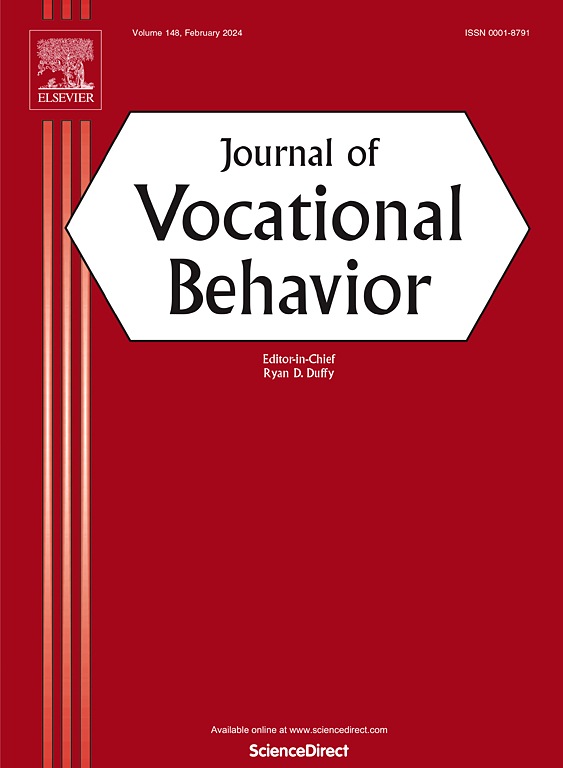How promotion-oriented job crafting affects job performance: Exploring the role of job-crafting motives
IF 5.2
1区 心理学
Q1 PSYCHOLOGY, APPLIED
引用次数: 0
Abstract
Although theory has recognized that promotion-oriented job crafting may not be inherently beneficial for individuals, previous research has primarily emphasized positive effects to the neglect of potential detrimental consequences. Drawing from the cognitive-affective processing system framework and conservation of resources theory, we propose a balanced model that simultaneously considers the beneficial and detrimental effects of promotion-oriented job crafting on multidimensional job performance (i.e., task performance, altruistic behavior, and workplace deviance). We examined our hypothesized model using three-wave data collected from 288 employees (Study 1) and daily diary data collected from 213 participants across two consecutive work weeks (Study 2). Results from these studies consistently supported the beneficial effects of promotion-oriented job crafting on job performance via positive affect. Results were less consistent regarding the detrimental effects of promotion-oriented job crafting. Study 1 revealed that promotion-oriented job crafting can directly induce a sense of entitlement (i.e., state workplace entitlement), yet Study 2 suggested that these detrimental effects were significant only when employees hold high levels of impression management motives for engaging in promotion-oriented job crafting.
以晋升为导向的工作制作如何影响工作绩效:探索工作制作动机的作用
虽然理论已经认识到,以晋升为导向的工作塑造可能对个人没有内在的好处,但之前的研究主要强调的是积极的影响,而忽视了潜在的有害后果。从认知-情感处理系统框架和资源保护理论出发,我们提出了一个平衡的模型,该模型同时考虑了以晋升为导向的工作塑造对多维工作绩效(即任务绩效、利他行为和工作偏差)的有利和有害影响。我们使用288名员工(研究1)收集的三波数据和213名参与者在连续两个工作周(研究2)收集的日常日记数据来检验我们的假设模型。这些研究的结果一致地支持了以晋升为导向的工作制作通过积极影响对工作绩效的有益影响。关于以晋升为导向的工作塑造的有害影响,结果不那么一致。研究1揭示了以晋升为导向的工作制作可以直接诱发权利感(即国家工作场所权利),但研究2表明,只有当员工在从事以晋升为导向的工作制作时具有高水平的印象管理动机时,这些有害影响才显着。
本文章由计算机程序翻译,如有差异,请以英文原文为准。
求助全文
约1分钟内获得全文
求助全文
来源期刊

Journal of Vocational Behavior
PSYCHOLOGY, APPLIED-
CiteScore
13.10
自引率
5.40%
发文量
85
期刊介绍:
The Journal of Vocational Behavior publishes original empirical and theoretical articles offering unique insights into the realms of career choice, career development, and work adjustment across the lifespan. These contributions are not only valuable for academic exploration but also find applications in counseling and career development programs across diverse sectors such as colleges, universities, business, industry, government, and the military.
The primary focus of the journal centers on individual decision-making regarding work and careers, prioritizing investigations into personal career choices rather than organizational or employer-level variables. Example topics encompass a broad range, from initial career choices (e.g., choice of major, initial work or organization selection, organizational attraction) to the development of a career, work transitions, work-family management, and attitudes within the workplace (such as work commitment, multiple role management, and turnover).
 求助内容:
求助内容: 应助结果提醒方式:
应助结果提醒方式:


